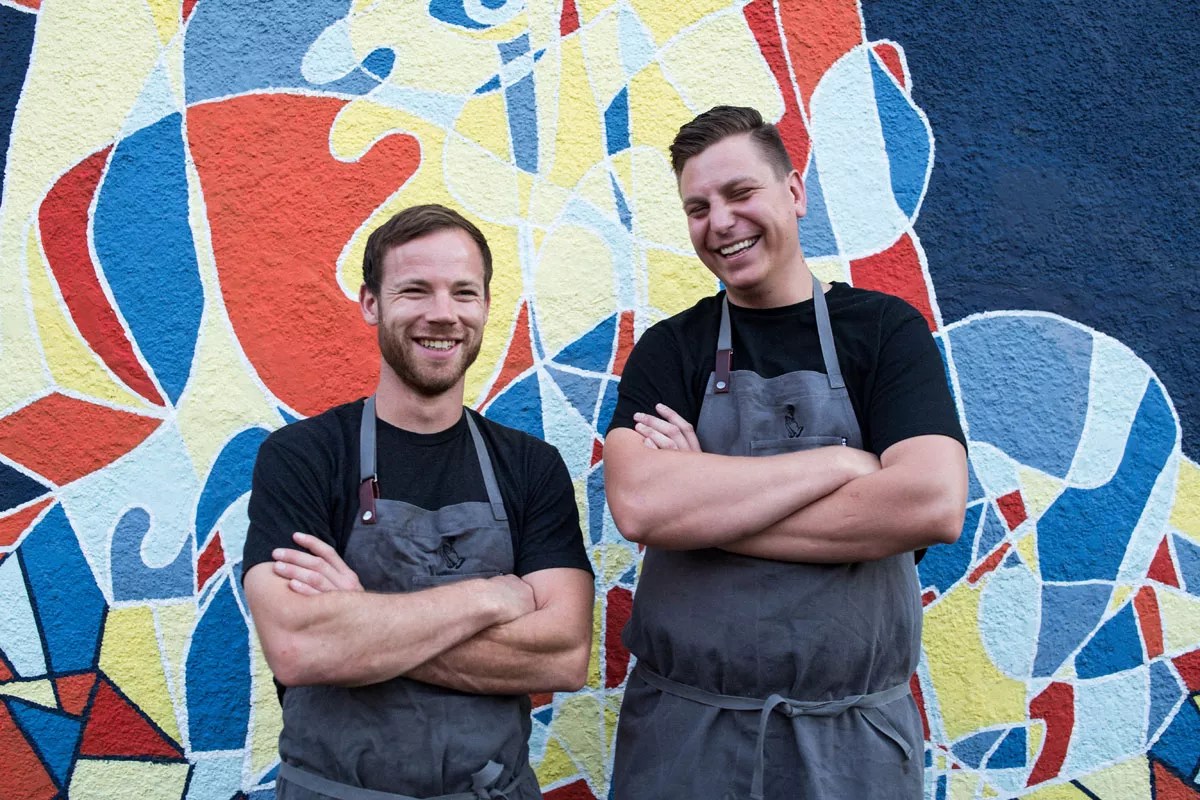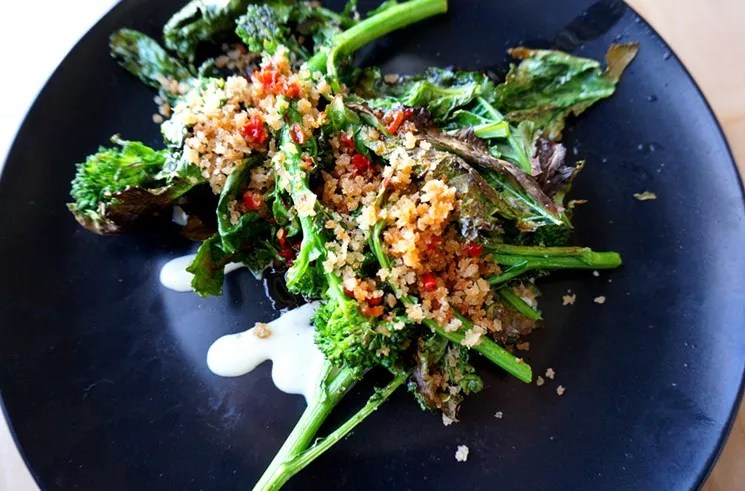
Holly Hursley

Audio By Carbonatix
Chefs Alex Figura and Spencer White have spent most of their careers at fine-dining restaurants: Figura cooked at Vetri, Blue Hill at Stone Barns and Frasca; White spent his formative years working under Frank Bonanno and Hunter Pritchett at Mizuna and Luca d’Italia. Fine dining brought them together, too: They met at Lower48 Kitchen, the award-winning restaurant at 2020 Arapahoe Street that closed after just two years in November 2015. But when they began talking in earnest about doing a restaurant together, they discovered a mutual desire in exploring the more casual side of the industry.
This past November, they opened Dio Mio, a fast-casual pasta joint, in RiNo. We recently chatted with the two chefs about their fascination with noodles, how they’ve adjusted to cooking outside of fine dining, and why fast-casual restaurants push the Denver dining scene forward.
Westword: You two worked together at Lower48 Kitchen and Black Eye, and now you’re in business together. You must have some sort of magic in the kitchen.
Spencer White: It’s strong, non-verbal communication.
Alex Figura: I didn’t hire him [at Lower48 Kitchen]; sous-chef Greg [Schesser] did. I don’t think I talked to him for a while. We spent hours and hours together on the line there every day, but I’m not a big speaker in the kitchen. I have very few words to say.
White: We worked well together, both on creation and execution. I always have big ideas, and Alex is like, “Whoa, dial that back.” We complement each other.
How did you get into this industry?
Figura: I grew up watching my parents cook all the time. My parents made dinner every night; we rarely went out. They opened a couple of frozen-yogurt stores when that was booming, but they quickly got out of them and went back to their old jobs. I got involved, then went to college. I lucked out: I got a job at Vetri in Philly. It was a fluke. I kept knocking on the door until three or four people quit in two weeks. I was the guy who was there. That started my career as a cook. From there, I wanted to see the bigger picture of the best restaurants. I worked at Blue Hill Stone Barns, Frasca and Celler de Can Roca in Spain, plus a couple other Michelin-starred restaurants.
White: I moved to Steamboat after high school. I wanted to be a ski bum, so I took classes at a community college and waited tables up there. When it was slow in the off-season, I’d often have to be making salads in the back. A chef came in from Chicago; he’d worked in L.A. at big-name places, and hanging out with him in Steamboat sparked my interest. He showed me the fine-dining scene. I started working for Frank Bonanno and Hunter Pritchett – that really put my drive forward and made me want to be a cook. I finished school and got a PR degree, so I did that for a little while, but then I realized there was no way I was going to be able to do PR and talk to people.
You both spent time cooking in Europe. Any formative lessons from those experiences that informed your work?
Figura: The first place I worked at in Spain was one of the most memorable restaurants. The chef de cuisine at the time…would make some form of classic Spanish cuisine every day for lunch, and we all sat down for lunch for an hour. There were coffees for everyone, dessert and fruit. To me, that was very awakening as to how important food can be. It brought people from all walks of life together. It was really incredible. It was the most important part of our day.
White: The coolest part of Copenhagen was all the kids that Noma [restaurant] brought there. You had all these kids from everywhere in the world – Italy and South America – and every night, we’d go out for beers. It was cool to be a part of it for a while…and to see that everything is connected now.
So how did Dio Mio come together?
Figura: A lot came from Spencer being a goofball. We both love fine dining, food and quality, but we’re both relaxed guys. At Lower48, we’d talk about going out and not wanting to spend a lot but still have a good time and great food. We had a few concepts on our minds, and this one seemed to strike a chord. We had great feedback on pasta from Luca d’Italia, Frasca and Lower48. It’s something we both have a passion about. You can be very imaginative with it, but it’s approachable.
Tell me a little more about your pasta passion.
White: It’s really dough of all sorts. Alex is a very talented baker. There are subtle nuances in pasta. It’s about the tiniest details. If you have 50 milligrams too much water in the pasta dough, it’ll be mushier than it should be when you cook it. It relies on dryness and the weather, and how much humidity is in the space. If you have the dishwasher running all day and the restaurant is extra humid, it’s a better day to make ravioli, because they stick together better. This is also why I love espresso: You do the same thing day after day after day, and the end result is never the same.
Figura: Anything that’s just flour and water, or very few ingredients, can change drastically. It’s frustrating and fascinating.

Dio Mio’s bagna cauda broccoli rabe.
Mark Antonation
Such an agonizing level of detail strikes me as a difficult thing to build a fast-casual restaurant on. And a lot of people regularly eat pretty shitty pasta.
White: Yeah, and we don’t want to stand by that.
Figura: I’m going to use my wife as an example. She used to love shitty pasta. As we were getting closer to opening, I started making her all these pastas. Now she won’t eat other pasta that isn’t at that level. Not that I have to make it: She’ll go to Luca or another restaurant that serves great pasta. But she’s very aware of the craft and how it’s executed. It’s way more than just dumping Prego on dry pasta.
You’ve downshifted from fine dining into fast-casual. Has that changed your cooking?
White: The only major difference is that we’re not putting as many Italian names on the menu. It’s the same pasta, and we’re sourcing the same ingredients. I don’t think Alex and I could envision using lesser products or cutting corners.
What about your approach to service? For one thing, it seems you two are more integrated into service now than you would have been when you were in the kitchen, behind a closed door.
Figura: We’re learning how to approach it. Hallie [Bauernschmidt], our GM, had a hard time at first: She’s very hands-on, and had to work on taking a step back. In fine dining, you want to nurture people more. But on a busy night here, you just can’t. So it’s figuring out a way to make people happy but not spend too much time. It’s a juggling act.
A lot of people point to Denver as a city that’s uniquely rife with fast-casual restaurants. You’ve jumped in that game now. Why do you think those concepts succeed here?
Figura: Denver is laid-back, and it pushes people in the direction of fast-casual. There’s a younger demographic here. People want to go to breweries and travel. They don’t necessarily have the food education of bigger cities, nor the temples of food or varieties. Denver is becoming a major city, but it’s not there yet. But I also think with all these fast-casual places doing these types of cuisine, we’re culturing that: Look at Biju’s, Cart-Driver, Work & Class, Hop Alley. You’re able to try more restaurants – it’s not just, “Oh, I’m going to go eat French at this four-star once a year.” You can eat Chinese food six times a year and learn something every time you eat it.
So fast-casual is a cheap and quick way to push forward the collective food knowledge.
White: I also think breweries are really educating the Denver scene a lot. People are tasting things and thinking about what they’re tasting. Doing that exercise pushes the Denver palate.
Do you have expansion plans?
Figura: That was the original idea, but no. Now that we’re here and doing it, no.
White: As we get deeper, the little things we’re talking about – the drops of water and quality – I don’t know that we could do it big.
Figura: We’d have to change focus a bit. We would not do pasta. We’ve put so much into this place. We built these tables and banquettes, painted the walls, hung the lights. We did it all. I don’t think we could do that again with a pasta concept.
Dio Mio is located at 3264 Larimer Street, and open from 4-9 p.m. Monday and Tuesday, 11 a.m-9 p.m. Wednesday and Thursday, 11 a.m.-10 p.m. Friday and 4-10 p.m. Saturday. For more information, call 303-562-1965 or go to diomiopasta.com.